
Recycling is the process of converting waste materials into new materials and objects. The recovery of energy from waste materials is often included in this concept. The recyclability of a material depends on its ability to reacquire the properties it had in its original state. It is an alternative to "conventional" waste disposal that can save material and help lower greenhouse gas emissions. It can also prevent the waste of potentially useful materials and reduce the consumption of fresh raw materials, reducing energy use, air pollution and water pollution.

Waste management or waste disposal includes the processes and actions required to manage waste from its inception to its final disposal. This includes the collection, transport, treatment and disposal of waste, together with monitoring and regulation of the waste management process and waste-related laws, technologies, economic mechanisms.

Ship-breaking is a type of ship disposal involving the breaking up of ships for either a source of parts, which can be sold for re-use, or for the extraction of raw materials, chiefly scrap. Modern ships have a lifespan of 25 to 30 years before corrosion, metal fatigue and a lack of parts render them uneconomical to operate. Ship-breaking allows the materials from the ship, especially steel, to be recycled and made into new products. This lowers the demand for mined iron ore and reduces energy use in the steelmaking process. Fixtures and other equipment on board the vessels can also be reused. While ship-breaking is sustainable, there are concerns about the use by poorer countries without stringent environmental legislation. It is also labour-intensive, and considered one of the world's most dangerous industries.

The recycling of paper is the process by which waste paper is turned into new paper products. It has a number of important benefits: It saves waste paper from occupying homes of people and producing methane as it breaks down. Because paper fibre contains carbon, recycling keeps the carbon locked up for longer and out of the atmosphere. Around two-thirds of all paper products in the US are now recovered and recycled, although it does not all become new paper. After repeated processing the fibres become too short for the production of new paper, which is why virgin fibre is frequently added to the pulp recipe.
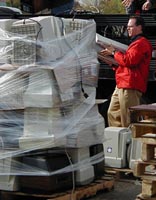
Electronic waste recycling, electronics recycling ore-waste recycling is the disassembly and separation of components and raw materials of waste electronics; when referring to specific types of e-waste, the terms like computer recycling or mobile phone recyclingmay be used. Like other waste streams, re-use, donation and repair are common sustainable ways to dispose of IT waste.
Marlboro is part of the City of Johannesburg Metropolitan Municipality and is a suburb of Sandton.

The City of Johannesburg Metropolitan Municipality is a metropolitan municipality that manages the local governance of Johannesburg, South Africa. It is divided into several branches and departments in order to expedite services for the city. Zulu is the most spoken home language at 23.4% followed by English at 20.1%.

Glass recycling is the processing of waste glass into usable products. Glass that is crushed or imploded and ready to be remelted is called cullet. There are two types of cullet: internal and external. Internal cullet is composed of defective products detected and rejected by a quality control process during the industrial process of glass manufacturing, transition phases of product changes and production offcuts. External cullet is waste glass that has been collected or reprocessed with the purpose of recycling. External cullet is classified as waste. The word "cullet", when used in the context of end-of-waste, will always refer to external cullet.

Electronic waste or e-waste describes discarded electrical or electronic devices. Used electronics which are destined for refurbishment, reuse, resale, salvage recycling through material recovery, or disposal are also considered e-waste. Informal processing of e-waste in developing countries can lead to adverse human health effects and environmental pollution.
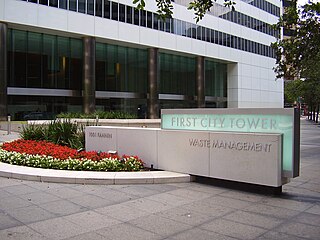
Waste Management, Inc., doing business as WM, is a waste management, comprehensive waste, and environmental services company operating in North America. Founded in 1968, the company is headquartered in the Bank of America Tower in Houston, Texas.
A mechanical biological treatment (MBT) system is a type of waste processing facility that combines a sorting facility with a form of biological treatment such as composting or anaerobic digestion. MBT plants are designed to process mixed household waste as well as commercial and industrial wastes.
Precycling is the practice of reducing waste by attempting to avoid buying items which will generate waste into home or business. The U.S. Environmental Protection Agency (EPA) also cites that precycling is the preferred method of integrated solid waste management because it cuts waste at its source and therefore trash is eliminated before it is created. According to the EPA, precycling is also characterized as a decision-making process on the behalf of the consumer because it involves making informed judgments regarding a product's waste implications. The implications that are taken into consideration by the consumer include: whether a product is reusable, durable, or repairable; made from renewable or non-renewable resources; over-packaged; and whether or not the container is reusable.
There is no national law in the United States that mandates recycling. State and local governments often introduce their own recycling requirements. In 2014, the recycling/composting rate for municipal solid waste in the US was 34.6%. A number of U.S. states, including California, Connecticut, Delaware, Hawaii, Iowa, Maine, Massachusetts, Michigan, New York, Oregon, and Vermont have passed laws that establish deposits or refund values on beverage containers while other jurisdictions rely on recycling goals or landfill bans of recyclable materials.
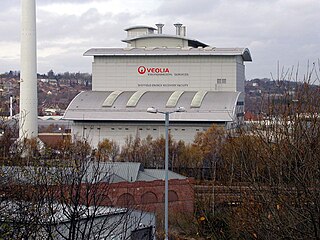
The Sheffield Energy Recovery Facility, also known as the Energy from Waste Plant, is a modern incinerator which treats Sheffield's household waste. It is notable as it not only provides electricity from the combustion of waste but also supplies heat to a local district heating scheme, making it one of the most advanced, energy efficient incineration plants in the UK. In 2004, the district heating network prevented 15,108 tonnes of CO2 from being released from buildings across the city, compared to energy derived from fossil fuels. The incinerator is a 'static asset' owned by Sheffield City Council and operated by Veolia Environmental Services under a 35 year integrated waste management contract (IWMC)/PFI contract.
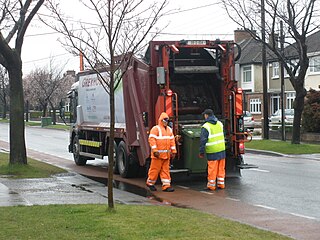
Rates of household recycling in Ireland have increased dramatically since the late 1990s. The Irish Environmental Protection Agency (EPA) is the agency with overall responsibility for environmental protection in Ireland and monitors rates of recycling in Ireland along with other measures of environmental conditions in Ireland. The EPA, along with Repak, the principal organisation for packaging recycling in Ireland, report on recycling rates each year. In 2012 Ireland’s municipal solid waste (MSW) recycling rate was 34%, while the rate of packaging recycling reached 79%. The amount of municipal waste generated per person per year in Ireland has fallen significantly in recent years. This figure remains above the European Union annual municipal waste average of 503 kg per person, however. Each local council in Ireland has considerable control over recycling, so recycling practices vary to some extent across the country. Most waste that is not recycled is disposed of in landfill sites.
SA Waste Holdings (Pty) Ltd is a waste management company, based in Johannesburg, South Africa, in Gauteng Province. It was launched in 1990, and as of 2003 boasted 626 staff members. The company boasts clients in the retail, commercial, entertainment and gambling sectors. SA Waste is a BEE conscious company, and has a Black Economic Empowerment (BEE) subsidiary, Kofifi Thusano (Pty) Ltd.
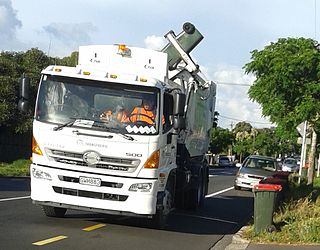
The management of waste in New Zealand has become more regulated to reduce associated environmental issues. According to OECD data, New Zealand is the third most wasteful country in the OECD.

Electronic waste is a significant part of today's global, post-consumer waste stream. Efforts are being made to recycle and reduce this waste.

Waste management in Bangladesh faces many challenges due to its large, rapidly growing population in a densely populated country.

Kya Sands is an informal settlement located in Region A of the City of Johannesburg.
















